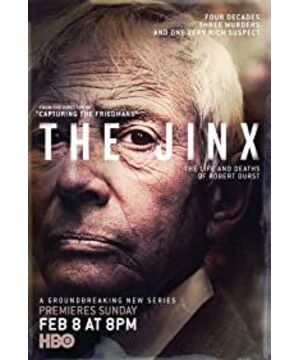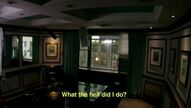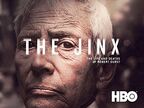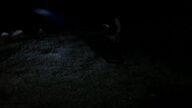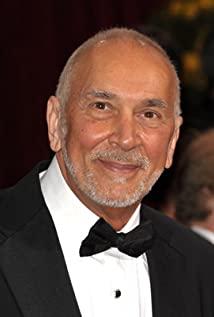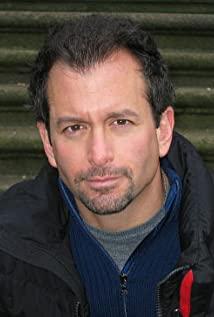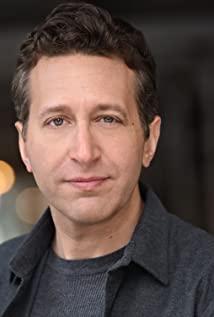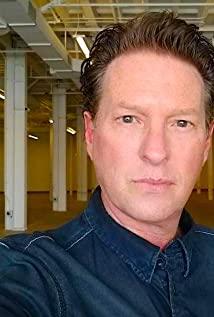Imagine that, as a person who has been paying attention to this matter for a long time and made a movie, suddenly BOOM, received an interview request from the person concerned, and suddenly BOOM, holding key evidence in hand, became the most vocal speaker on this matter. Right person.
Honestly, buddy, no one can calm down. When I change to me, I feel a sense of historical mission spontaneously. This kind of opportunity is really unprecedented. From Capote to David Fincher, everyone is jealous. Tears!
In the fifth episode, Robert Durst wanders on Times Square, outside his own building, and near coffee shops. There is no passerby looking at him. He looks like an ordinary haggard, slightly neurotic old man, not the handsome white horse in Long Island, New York when Cathie first met. The prince is not a strong man like his father (the "Las Vegas Gang") that Susan Berman would talk about. He is old, his heart is trapped in the fear of making mistakes, and the devil and the little boy are gradually showing their true shape.
The most conclusive slaughter in his life was also the most embarrassing and most inelegant slaughter, which put him in the court and it was impossible to get out again. After he shot and killed a 71-year-old neighbor who might be older and more rascal than him, he dismantled it and dealt with it hastily. For him, failing to clean the scene may not be unintentional but powerless.
"Fortunately", he once again relied on the superiority of the judicial system to escape sanctions with a powerful team of lawyers. Unfortunately, the devil will grow old and lonely. Maybe he can dominate many people and bring misfortune to those around him, but he is still powerless to his own destiny. Faced with the ignorance (abandonment) of his brother Doulas and the whole family, he is like a debilitated neurotic old man like never before.
Andrew Jarecki turned to the camera and said: "After contacting someone from the Durst family, I understood why he came to me."
Filming this documentary will not be very comfortable. When you stare into the abyss, the abyss is looking back at you, even if it tries to put a friendly smile on your face, and slowly tells you about the first half of your life.
Almost Human (close to human) is the reason I watched this documentary for the creepy. This creepy doesn't come from the cold corpses in the first episode, nor from Bob's barely visible white eyes. But from the fourth episode of the court hearing, Cathie’s friend said that I almost sympathized with Bob because he smiled at me, a friendly smile of "Ah, I recognize you here," rather than a threatening smile. .
In Capote's "Cold Blood", there is a detail that is sentimental, as Perry is still worrying that the victim's homeowner kneels on the cold ground and feels uncomfortable and puts a cushion in front of the door. Perry admitted that the owner and family he shot were good people, but perhaps, "someone has to pay for everything he (Perry) has suffered." The ups and downs of childhood, the traumatization of youth and the interruption of education, the imprisonment of the mature man, and the abandonment of his relatives. These unforgettable traumas of Perry have become the reason for his massacre; Capote can't forget even more. Perry’s life experience is so similar to him. “One went through the front door and the other went through the back door.” He just chose to decide his fate. For example, the prince and the beggar’s dress-up game had completely different consequences.
After Perry's death, Capote was devastated and could no longer write good works. With Perry's death, Capote had to face the abyss in his heart, and it was impossible to get a trace of redemption.
Are Perry and Capote the same kind of people, we say no, only Capote knows it; but is Perry "us"? This question is difficult to answer. We all know that Robert Durst cannot attribute all his problems to seeing his mother jump off the building when he was young. This is unfair to all those who are unfortunate because of him. But we still try to take precautions before they happen, examine the soil of society and the depths of our own nature, and try to find some clues. I think this is the biggest significance of this documentary, otherwise the truth will not be more worth watching than David Fincher.
In comparison, Robert Durst's brother may not really be cold, at least his brother is a normal "Berkeley graduated yuppie", a modern person. Robert Durst may have been born in the wrong age, but in any age his temperament endowment may be recorded in history because of its anomalies, such as the tyrants of ancient Rome, such as the notorious nobles and criminological research objects in the Middle Ages. This kind of perspective makes me feel more comfortable when looking at this documentary.
Similarly, this documentary has not risen to the institutional level, because Robert's case is too special. It took two thousand years for human beings to learn to tolerate dissidents, because some “dissidents” are the source of social innovation rather than the objects that need to be dictated. Even with people like Robert, it is no exception. After all, it is a probability problem. Under the system, there are also kind police officers, smart lawyers, and vocal judges in the film.
Since this is an individual case that cannot be replicated, I can't help but care more about what the director thinks. Capote could not dissolve the influence brought about by the work of "Cold Blood", and I suspect that Andrew Jarecki could not dissolve this influence, although in the follow-up part of the documentary, the subjective (with guiding nature) images may be the director's thought "Heaven" I’ll leave the great to me.” I can restore justice, but no one is and cannot be an omniscient and omnipotent God. Justice is neither here nor there. What the jury does is not God’s thing, but what the victim does when the victim is absent. Thing.
Andrew Jareki positioned Robert Durst as the exiled Cain, the eldest son of the lost business map of the Durst Empire. When he was in the high Olympia Mountains, he spontaneously retreated to the auditorium instead of a faithful record. However, neither of these two roles can serve as messengers of justice. This is my only dissatisfaction with this documentary that is well-placed and harmonious. But perhaps no bystander can do better anymore, except for being darkened. The deeper the roll, the deeper and deeper the roll.
Under what circumstances is justice present and justice should not be present?
To be or not to be, that's a question.
View more about The Jinx: The Life and Deaths of Robert Durst reviews


